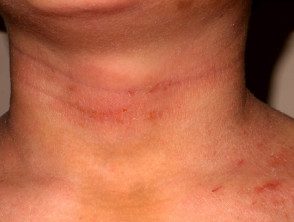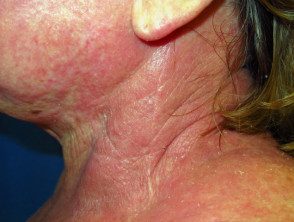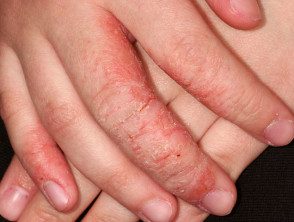Introduction
Atopic dermatitis, also known as atopic eczema, is a chronic or recurrent skin condition characterized by intense pruritus (itching) and disfiguring rashes. It is the most common skin disorder of childhood. About 50% of people affected by atopic dermatitis during childhood continue to suffer from it in adulthood.
- Dermatitis often affects visible areas like the face and neck.
- Chronic dermatitis constantly itches.
- Rubbing and scratching leads to lichenification (thickened skin).
- Hypopigmentation, hyperpigmentation and post-inflammatory pigmentation They are common.
Atopic dermatitis can lead to negative psychological effects such as social isolation and low self-esteem.
Atopic dermatitis

Atopic dermatitis

Atopic dermatitis affecting the neck.

Atopic dermatitis
What are the psychological effects of atopic dermatitis?
the psychosocial The effects of atopic dermatitis can be profound.
- Preschool-age children with atopic dermatitis have a higher risk of hyperactivity and greater dependency on their parents compared to unaffected children.
- Children with atopic dermatitis are prone to teasing and bullying at school, which can lead to social isolation, poor school performance, and feelings of social stigmatization.
- Lifestyle restrictions with atopic dermatitis include restrictions on what type of clothing can be comfortably worn, having pets, and physical / leisure activities such as swimming or sports / outdoor activities.
- Children and adults with dermatitis may have a poor self-image, low self-esteem, and diminished social skills.
Assess the impact of atopic dermatitis.
The Dermatitis Family Impact (DFI) questionnaire can be used to assess the impact of atopic dermatitis on the patient and their family. Evaluate:
- The financial burden of dermatitis.
- The impact on the family and the social aspects of the disease.
- Personal tension
- How well the family / patient is managing their illness.
At least one study has found that the impact of having children with dermatitis is similar to the family impact of having children with diabetes or asthma with respect to the cost of care, the changes the family must make to cope with the disease and stress in family relationships.
Atopic dermatitis and depression.
Patients with severe atopic dermatitis have high levels of depression.
- Depression is often related to a decrease in quality of life due to insomnia / lack of sleep due to intense itching; This lack of sleep can lead to emotional problems and thinking problems.
- Stress is also a trigger for dermatitis. exacerbations (outbreaks), leading to increased itching, changes in permeability and homeostasis of the skin and the acceleration of the response of the immune system.
Where can people go for help?
Treatment for atopic dermatitis may require collaboration between a dermatologist and a psychologist or psychiatrist to treat the physical and psychological effects of the disease.
Treatment for the psychological components of the disorder may include:
- Psychological counseling, including cognitive behavioral therapy, relaxation therapy, and habit reversal training.
- Psychotropic medications, such as antidepressants
- Participation in patient support groups.
